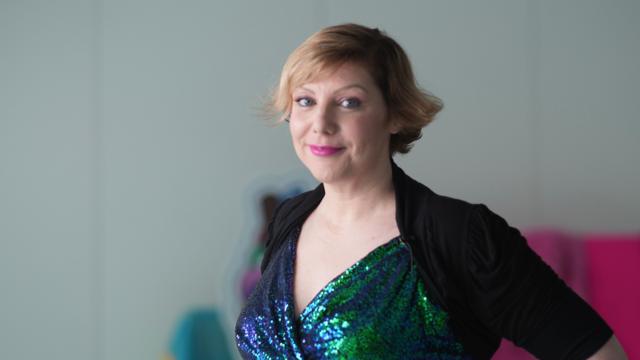
Image source, Jamie Niblock/BBC
Hannah Aria founded Neurodelicious to showcase neurodivergent performers
- Author, Zoie O’Brien
- Role, BBC News, Suffolk
A documentary aims to tackle the “sweeping assumptions” made about neurodivergent performers.
Neurodelicious, an Arts Council-funded group based in Suffolk, produced Difference Is Delicious to celebrate neurodiversity.
The founder of the group, Hannah Aria, said the reaction to the film so far had been “phenomenal”.
However she felt there could be more accommodation in the wider film industry for those with neurodivergent conditions such as ADHD or autism.
‘More understanding’
“A lot of the stuff that has been commissioned generally is around sensory integration and children,” Ms Aria said.
“We wanted something that was bold and a little bit risky. It’s really taken off.”
Ms Aria has a range of conditions including dyslexia, dyspraxia, dyscalculia, Ehler’s-Danlos syndrome and ADHD which means she is “clumsy, disorganised, hilarious, spontaneous, impulsive and life is never boring”.
She says the wider film industry needs to be aware of issues faced by neurodivergent people, such as her own struggles with bright lighting on sets and stages.
“If you’re unable to stand in that setting then there needs to be accommodation and if people don’t have an understanding of that condition often you can end up agreeing to putting yourself through torture for no reason,” she said.
Since the release of the documentary earlier this month, Ms Aria said she had heard from several people who have since been diagnosed with some form of neurodivergence.
“The amount of people that I’ve come into contact with and have got diagnosed officially has been phenomenal including people who had been struggling in silence for so long,” she said.
“I think it’s important that people don’t stereotype neurodivergent people.
“There are these sweeping assumptions, but we’re all so different and we have so much to bring to the table.”
Image source, Jamie Niblock/BBC
Oliver Squirrel urges everyone to have a look at the group’s documentary
The film’s co-director Oliver Squirrell said he got involved with the project after noticing a lack of talk about neurodivergence.
“Before I started working with Hannah I’d never heard of the phrase access or neurodivergence,” he explained.
“The more I heard about it – particularly in the performance and creative arts – I just thought we need to do something to help artistic talent progress their career and to make arts experiences truly more accessible to more people.”
He urged people to watch the documentary to learn more about themselves and others.
“Even just by going and looking at our documentary there will be a whole heap of learning curves to understand about how people’s brains function differently,” he said.
“I would urge people to find out as much as they can about [neurodivergence] and our documentary is a good starting point – it’s very fun and energetic.”
Image source, Jamie Niblock/BBC
Rosy May describes her ADHD and autism as her “superpower”
“The more I delve into the industry the more neurodivergent people I find,” she said.
She believes there is still a “massive stigma” around neurodivergence.
“Everything that has ever happened to me now makes so much more sense,” she said.
“I was able to feel proud of it and have it as a superpower.
“You feel safe knowing no-one is going to stigmatise you because of the challenges you face – they’re encouraged and supported.”
Speaking about the documentary, Ms May added: “Having a celebration of different creative people in Neurodelicious with so much colour and excitement is such an amazing thing to be a part of.”